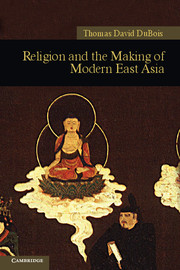Book contents
- Frontmatter
- Contents
- List of Boxes, Figures, and Maps
- Preface
- 1 In the beginning: Religion and history
- 2 Ming China: The fourteenth century's new world order
- 3 The Buddha and the shōgun in sixteenth-century Japan
- 4 Opportunities lost: The failure of Christianity, 1550–1750
- 5 Buddhism: Incarnations and reincarnations
- 6 Apocalypse now
- 7 Out of the twilight: Religion and the late nineteenth century
- 8 Into the abyss: Religion and the road to disaster during the early twentieth century
- 9 Brave new world: Religion in the reinvention of postwar Asia
- 10 The globalization of Asian religion
- Glossary
- Timeline of dynasties and major events
- Suggestions for further reading
- Index
9 - Brave new world: Religion in the reinvention of postwar Asia
Published online by Cambridge University Press: 05 June 2012
- Frontmatter
- Contents
- List of Boxes, Figures, and Maps
- Preface
- 1 In the beginning: Religion and history
- 2 Ming China: The fourteenth century's new world order
- 3 The Buddha and the shōgun in sixteenth-century Japan
- 4 Opportunities lost: The failure of Christianity, 1550–1750
- 5 Buddhism: Incarnations and reincarnations
- 6 Apocalypse now
- 7 Out of the twilight: Religion and the late nineteenth century
- 8 Into the abyss: Religion and the road to disaster during the early twentieth century
- 9 Brave new world: Religion in the reinvention of postwar Asia
- 10 The globalization of Asian religion
- Glossary
- Timeline of dynasties and major events
- Suggestions for further reading
- Index
Summary
Opiate of the masses: Why Marxism opposes religion
To abolish religion as the illusory happiness of the people is to demand their real happiness.
Karl Marx, Contribution to the Critique of Hegel's Philosophy of Law, 1844October 1 is a national holiday in China, one that is increasingly marked by a massive flood of travelers taking to the skies and rails. The reason is that October 1 marks the anniversary of the founding of the People's Republic. On this day in 1949, Mao Zedong stood atop the red walls of what had once been the Forbidden City and, in his thick Hunan accent and unexpectedly squeaky voice, proclaimed to an ecstatic crowd that “the Chinese people have finally stood up!” For decades, pictures of that moment would adorn countless Chinese homes, schools, and workplaces.
There was no mistaking that this was a day of momentous significance. In 1911, the Qing dynasty had fallen not with a bang, but with a whimper. The Qing was not so much overthrown as much as the decaying structure collapsed under its own weight; the decades of chaos that followed occurred precisely because there was no power strong enough to take its place. In contrast, the 1949 Communist Revolution was led by a party that was highly organized, with an unmistakable ideology, decades of experience recruiting peasants and fighting guerrilla wars, and as many as five million tough and highly disciplined members.
- Type
- Chapter
- Information
- Religion and the Making of Modern East Asia , pp. 194 - 223Publisher: Cambridge University PressPrint publication year: 2011

